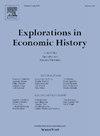The Inquisition and the decline of science in Spain
IF 1.7
1区 历史学
Q1 ECONOMICS
引用次数: 0
Abstract
A traditional argument that the Spanish Inquisition did not depress scientific research is that Spain experienced its Golden Age (1492–1657) after the Inquisition was formed (1478). Yet the arts, rather than the sciences, flourished; and we argue that the Inquisition had important chilling effects on the latter. Historically focused on persecuting suspected Jews, the Inquisition began refocusing its efforts on Protestantism, especially during the Council of Trent (1545–1563). The discovery of Protestant networks in two Spanish cities in 1557–58 helped fuel an abrupt increase in, and re-targeting of, inquisitorial activity. Scholars should have reacted by limiting their contacts and by exiting certain fields and institutions. To provide evidence for our account, we first document Spain’s decline in STEM fields, relative to the rest of Europe. We then provide the first systematic evidence on scholarly interactions among early modern Spanish book authors, documenting an immediate reduction in interactions after 1559, followed by a downward trend. We also document a significant reversal in a previously upward trend in affiliation with secular educational institutions. Since interacting with others working on similar problems is essential to progress in the sciences, our work helps explain the puzzling disjuncture between the glory of Spanish literary and visual arts during the Golden Age, on the one hand, and the poverty of its contributions to science, on the other.
宗教裁判所与西班牙科学的衰落
西班牙宗教裁判所没有抑制科学研究的传统观点是,西班牙在宗教裁判所成立(1478年)后经历了黄金时代(1492年至1657年)。然而,繁荣的是艺术,而不是科学;我们认为宗教裁判所对后者有重要的寒蝉效应。历史上,宗教裁判所的重点是迫害有嫌疑的犹太人,但在特伦特会议(1545-1563)期间,宗教裁判所开始将精力重新集中在新教上。1557年至1558年,在西班牙的两个城市发现了新教网络,这帮助推动了调查活动的突然增加和重新定位。学者们的反应应该是限制他们的接触,并退出某些领域和机构。为了为我们的解释提供证据,我们首先记录了西班牙相对于欧洲其他国家在STEM领域的衰落。然后,我们提供了早期现代西班牙书籍作者之间学术互动的第一个系统证据,记录了1559年后互动的立即减少,随后呈下降趋势。我们还记录了与世俗教育机构联系的先前上升趋势的重大逆转。由于与其他研究类似问题的人交流对科学进步至关重要,我们的工作有助于解释黄金时代西班牙文学和视觉艺术的辉煌与对科学贡献的贫乏之间令人困惑的脱节。
本文章由计算机程序翻译,如有差异,请以英文原文为准。
求助全文
约1分钟内获得全文
求助全文
来源期刊

Explorations in Economic History
Multiple-
CiteScore
2.50
自引率
8.70%
发文量
27
期刊介绍:
Explorations in Economic History provides broad coverage of the application of economic analysis to historical episodes. The journal has a tradition of innovative applications of theory and quantitative techniques, and it explores all aspects of economic change, all historical periods, all geographical locations, and all political and social systems. The journal includes papers by economists, economic historians, demographers, geographers, and sociologists. Explorations in Economic History is the only journal where you will find "Essays in Exploration." This unique department alerts economic historians to the potential in a new area of research, surveying the recent literature and then identifying the most promising issues to pursue.
 求助内容:
求助内容: 应助结果提醒方式:
应助结果提醒方式:


